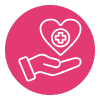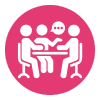Addiction counselling and therapies
When treating addiction, it’s important to note that not everyone responds to rehab treatment in the same way. Every individual is different and what works for one person may not be as successful for another. At Banbury Lodge, we utilise a comprehensive strategy to rehabilitate individuals with addiction, combining various therapy and treatment methods proven through research and our own experience to be effective. Our aim is to arm you with the tools needed to remain abstinent from substances long-term.
What type of addictions can therapy help treat?
When most of us think of addictions, we instantly think of an addiction to a legal or illegal substance. Sadly, addiction doesn’t just stop there.
People can become addicted to gambling, shopping, video games, sex and many other activities or behaviours. This is known as behavioural addiction and is defined as a condition that results in an individual engaging in actions despite the negative consequences it may have on their overall health.
Below is a list of the different types of addictions, including behavioural and substances;
- Substance
- Alcoholism
- Drug addiction
- Gambling addiction
- Food addiction
- Internet addiction
- Video game addiction
- Shopping addiction
- Sex and love addiction
- Pornography addiction
- Process addictions like workaholism or spending too much time on social media
It should be noted that this list is just some of the most common addictions and many more have been medically documented.
What types of therapies are used for addiction at Banbury Lodge?
Our clinic offers the highest level of care and expertise in addiction therapy. We believe in providing our clients with a comprehensive, individualised approach to their recovery. The Banbury Lodge team of counsellors and clinicians are experts in their field and are dedicated to helping each client find the path to lasting sobriety. Our team knows that addiction is a complex and challenging condition but that recovery is possible. We are proud to offer the following therapies;
12-Step Therapy
12-Step therapy. This method includes various steps, including admitting powerlessness, seeking help from a higher power, self-examination, making amends and helping others.
Art Therapy
Art therapy is a creative form of therapy. It utilises art within therapy as a primary means of communication and expression. You do not require artistic skill in order to benefit. Learn more below.
Cognitive Behavioural Therapy
Focuses on identifying and changing unhelpful thinking and behaviour patterns that contribute to addiction. It teaches coping strategies.
Dialectical Behavioural Therapy
Combines CBT with self-awareness techniques to teach patients improved and healthier coping skills, as well as self-acceptance.
Group Therapy
Group therapy fosters a supportive environment where individuals share experiences, challenges, and successes. It promotes connection, accountability, and mutual understanding in recovery.
Individual Therapy
Helps individuals gain insight into their relationship with substances and work through underlying issues that could be contributing to their addiction.
Family Therapy
Family therapy is a popular form of therapy, and involves exploring family dynamics and then further examining behaviours that may have lead to, or been exacerbated by addictive behaviours.
Trauma Therapy
Addresses past traumatic experiences that may contribute to addiction. Techniques like EMDR or trauma-focused CBT help individuals heal and rebuild emotional resilience. Click to learn more
Sound Therapy
Uses music, sound and vibrations to help bring a sense of balance, release stored emotions and reset the body’s natural healing systems.
Meditation
When it comes to meditation for addictions, it involves focusing on your breath and body in order to become more aware of thoughts and feelings.
Mindfulness
A practice of paying attention to the present moment with acceptance and non-judgment. It can help individuals create coping strategies. Learn more below.
What is the main aim of addiction therapy?
Addiction therapy is a process aimed at helping individuals with addictions to identify and address the underlying causes of their addiction. Treatment typically involves individual and/or group counselling, medical care, educational activities and lifestyle modifications. Addiction treatment aims to help people develop the skills necessary to maintain sobriety in the future, while also improving overall mental health and functioning.
In therapy, you are encouraged to embrace the following goals:
- Recognise and understand your triggers for the specific addiction
- Explore and replace unhelpful coping strategies
- Develop new skills for managing stress and emotions
- Practise healthy communication
- Create a plan for ongoing recovery
- Address any underlying mental health issues that may be contributing to your addiction
How should I approach addiction therapy?
The most important mindset to have during addiction therapy sessions is one of openness and willingness to learn. You should also try to maintain an attitude of self-compassion and understanding, rather than self-criticism or judgement. It is important to keep an open mind and be willing to explore alternate points of view when considering your thoughts and behaviors related to addiction. Your commitment to achieving recovery is paramount, but always remember that our team is here to help you along the way. We also suggest the following tips in order to prepare yourself for your journey;
If you’re struggling with addiction, please don’t hesitate to reach out to Banbury Lodge for help. Professional therapy can provide the support and guidance you need to overcome the challenges of addiction and live a healthier, happier life. Don’t let addiction be a barrier to living the life you want; seek help today and take the first step on the road to recovery.
Frequently asked questions
- Encourage them to attend all of their therapy sessions and follow the recommended treatment plan.
- Offer emotional support and be a listening ear when needed.
- Help them stay away from situations or people that could trigger them or cause a relapse.
- Offer to help them stay organised, such as with medications or doctor’s appointments.
- Join a family therapy session or support group if possible.

















